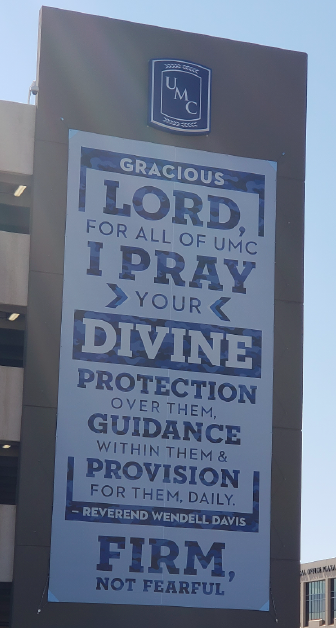
The Freedom From Religion Foundation is insisting that a large Texas public hospital stop engaging in unconstitutional religious promotion.
Multiple concerned University Medical Center community members, including an employee, have reported that the Lubbock hospital displays a huge religious banner on its employee parking structure. The banner says: “Gracious Lord, for all of UMC I pray Your divine protection over them, guidance within them & provision for them daily. — Reverend Wendell Davis. Firm, not fearful.”
The University Medical Center needs to remove this religious banner from its property, since it represents an unconstitutional endorsement of religion over nonreligion, FFRF asserts.
“The Establishment Clause prohibits government sponsorship of religious messages,” FFRF Staff Attorney Chris Line writes to University Medical Center President/CEO Mark Funderburk. “The Supreme Court has said time and again that the ‘First Amendment mandates government neutrality between religion and religion, and between religion and nonreligion.’ Like the Ten Commandments posters in county buildings in McCreary and the crèche display on county land in Allegheny, this display of religious sentiment on a large banner directed towards the public on a public hospital would be viewed by a reasonable observer as an endorsement of religion, and is therefore unconstitutional.”
Federal courts have upheld restrictions on the display of religious materials by government employees on government property because such restrictions exist to avoid Establishment Clause violations, FFRF informs the Medical Center. The 9th U.S. Circuit Court of Appeals has stated that the “government has a greater interest in controlling what materials are posted on its property than it does in controlling the speech of the people who work for it.” Tucker (1996)
In addition, a concerned University Medical Center community member has reported that the Medical Center creates videos featuring chaplains that promote and endorse Christianity. For example, one video, entitled “Chaplain Larry Cothrin — Endurance” encourages patients to endure using Christian messaging: God is a great God. He’s a miracle working God and He can take care of this. Jesus said, “With man this is impossible, but with God all things are possible.” Let me encourage you not to give up or to give in. God is in control.
The video ends with the official Medical Center logo and is posted on its Vimeo page.
By publishing overtly Christian messages, the University Medical Center violates the Establishment Clause, FFRF underscores. When a public hospital regularly promulgates religious concepts to employees and the public, it sends a message that the government supports those ideas. The University Medical Center serves all citizens regardless of belief or nonbelief, and a Christian banner and chaplain videos alienate the 24 percent of Americans who are nonreligious.
Chaplains are bound by the First Amendment just as any other government employee is, and the center’s office is liable for their constitutional violations. While patients are trying to receive care and employees are trying to work, many are forced to listen to preaching by someone who does not share their deeply held religious or nonreligious views. One can imagine how people would react if they were forced to listen to an imam deliver a prayer to Allah.
FFRF is asking the University Medical Center to discontinue its chaplaincy and cease creating and promoting religious videos. It must also remove the religious banner from its parking structure, the state/church watchdog demands.
“A constant intrusion of the majority religion is disrespectful to the employees and patients of the Medical Center,” says FFRF Co-President Annie Laurie Gaylor. “Such practices are not in keeping with everyone’s preferences.”
The Freedom From Religion Foundation is a national nonprofit organization with more than 35,000 members and several chapters across the country, including over 1,500 members and a chapter in Texas. Its purposes are to protect the constitutional principle of separation between state and church, and to educate the public on matters relating to nontheism.

